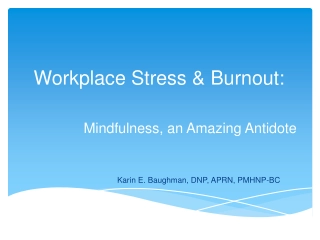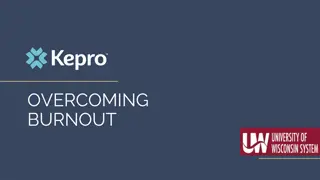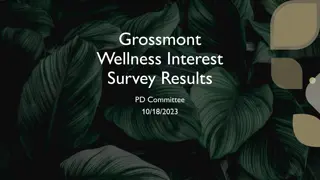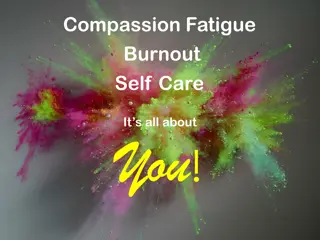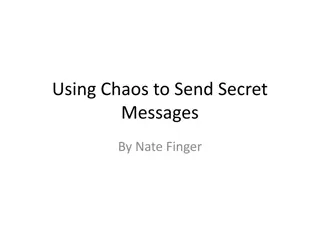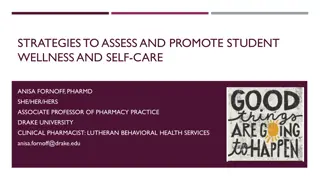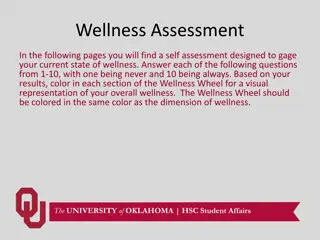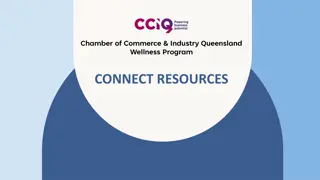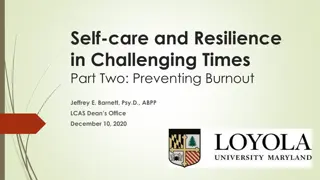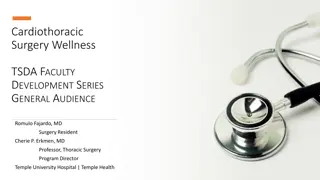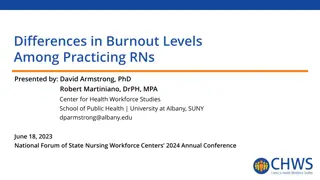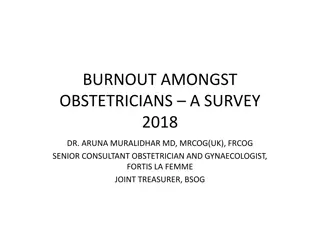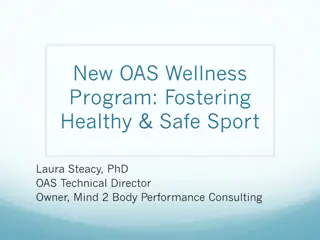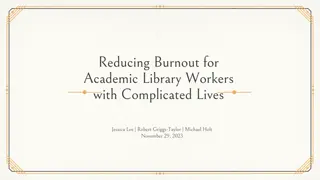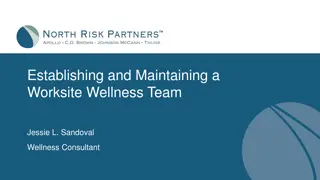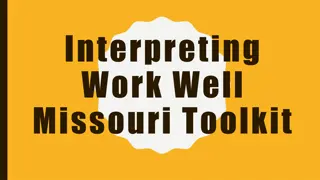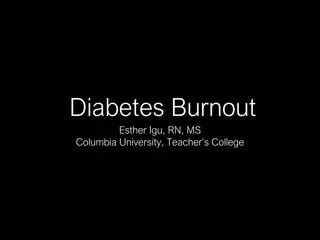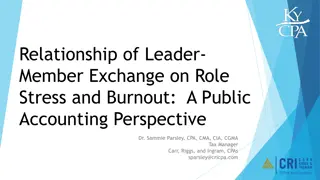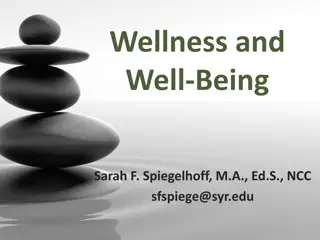Understanding Burnout and Wellness in a Chaotic World
Dr. Asher Morgan explores the concept of burnout and wellness in a busy world, emphasizing the importance of self-care and recognizing the signs of burnout. The presentation delves into topics such as human giver syndrome, stress management, values-driven actions, and the interplay between fear and motivation in our daily lives, offering insights on coping strategies and fostering personal well-being.
Download Presentation

Please find below an Image/Link to download the presentation.
The content on the website is provided AS IS for your information and personal use only. It may not be sold, licensed, or shared on other websites without obtaining consent from the author. Download presentation by click this link. If you encounter any issues during the download, it is possible that the publisher has removed the file from their server.
E N D
Presentation Transcript
Battling Burnout: Wellness in a Chaotic World Dr. Asher Morgan UARK Wellness University Recreation
Purpose of this Presentation We all experience times of overwhelm & exhaustion by all that we have to do. Yet, we worry we are not doing enough. We try to put on our own oxygen masks before helping others, but then the semester starts, and our students and staffs have crises (big and little) and we put ourselves on the back burner. Wellness and self-care has become another thing on the never ending "to-do" list and we "should" ourselves about it.
Check In With Yourself & Your Table On a scale of 1-10, how stressed are you feeling in general in your life right now? On a scale of 1-10, how well do you feel you are coping with that stress? On a scale of 1-10, how burned out do you feel right now?
Human Giver Syndrome System in which a group of people (human givers) are expected to offer their time, attention, affection, and bodies willingly to other groups of people (human beings). In these terms, human beings have a moral obligation to be or express their humanity, while human givers have a moral obligation to give their humanity to the human beings. In this scenario, supervisors who may be faculty, staff, GAs, TAs are the givers, and our students and any supervisees are the human beings. We are expected to be available for them and their every need being happy, calm, generous, and attentive to needs BUT human givers are not supposed to need anything themselves.
What is Burnout? Emotional exhaustion mental, emotional, and physical fatigue that comes from caring too much for too long. Depersonalization - depletion of empathy, caring, & compassion. Decreased sense of accomplishment - an unconquerable sense of futility: feeling that nothing you do makes a difference.
Values What drives us Person values Professional values Departmental values Institutional values
Fear Values and fear cannot be separated When you care deeply about something, this can create a fear of failure or loss Us, and our students, have increased levels of anxiety because we do not just want to be successful, but we want to be successful at something that matters to us and seeking that can be terrifying. It also has a much greater chance of leading to burnout than to flourishing.
Fear of Failure (Pressure) Cost personal, professional, other Perceived evaluation Uncertainty Fear-Based Model of Excellence Natural Responses Avoid/escape until "have to" Over-control, mastery, perfectionism
Stress & Stressors What are they? How are they different?
Stressors What activate the stress response in your body. Can be a sight, smell, sound, touch, taste, or image that can do you any harm. External Stressors: work, money, family, time constraints, cultural norms & expectations, experiences of discrimination, and more. Internal Stressors: self-criticism, body image, identity, memories, perfectionism, The Future, and more. In many ways all of these things can be interpreted by your body as potential threats.
Stress Neurological and physiological shift that happens in your body when you encounter one of these threats. Can trigger fight/flight/freeze/fawn responses Fawn - abandoning your own needs to serve others and avoid conflict, criticism, or disapproval. Aims to please, appease, or pacify a potential threat to keep yourself safe from harm.
Stress Glorification Culture All we talk about, sometimes even brag about, is how hard we are working and how overwhelmed we are by everything that we have to do.
Important Factors Sometimes you cannot control the stressor, so you have to learn to control your stress. OR Just because you have dealt with, reduced, or eliminated the stressor does not mean you have effectively dealt with the stress itself that was caused. (Sound familiar?)
The threat may be reduced or gone, but your body is still in full action mode because you have not done anything to signal to it that you are safe now. You become stuck in your stress response. Example: Someone at work, co-worker or student, does or says something that just sets you off either externally or internally and it impacts your whole day, or you even carry it home with you after you leave work.
Reasons This Happens Chronic Stressor that leads to chronic stress: situation or responsibilities that you cannot change at this moment. Social Appropriateness: being unable to get out of a situation or task so as not to seem impolite, weak, some other emotion. It is Safer: sometimes we are unable to address a situation head on as it will lead to increased risk or danger. However, this is a survival strategy and not a way to cope with stress.
The Plateau Effect Need reassurance that everything will be okay Become dependent on outcomes Evaluation: when your mind starts keeping score of how it is going or how you did on something This is the leading cause of strain, burnout, and insomnia What we didn't get done and what are we going to do about it tomorrow
Mindful Actions Essential Nourishment: Establish your purpose What is it you want to do everyday? Acceptance things change, things happen, failure may occur but we are learning to stand by our values. Meaning - Why are you doing what you do everyday? Enhanced Seasonings (helpful but not required): Enjoyment we say "we love what we do". But, are you enjoying it, even on the hard days? Healthy self-care staying present with your stress; not checking out/avoidance Give & receive encouragement
Effective Coping Honor your reactions, but challenge the conclusions and irrational thoughts that may happen in the midst of adversity or difficulty. Some things are hard, we make mistakes, we are human. Feel the feelings but learn to answer the question: "What is true about me even on my worst day?" to find your worth. Ask those around you if you're unsure. Commit to Self-Care. For the health of it, not to feel better. Sometimes self-care is hard and does not make you feel better in the moment. Self-care is subjective and different for every human. Also, learn the difference between self- care and soothing. They are similar but soothing often focuses on simply feeling better. Do something of personal rightness in alignment with your values. Step into something that matters to you to help you cope. Again, self-care over soothing.
Ways to Complete the Stress Cycle Physical Activity moving your body in whatever way that you enjoy has been proven to be the most effective way to close the stress cycle. Breathing Intentionally - deep, slow breathing focusing on the exhalation. Positive Social Interaction Laughter deep, possibly impolite, belly laughs. Affection an intentional hug, a six-second kiss with a partner, petting or cuddling with a pet. A Good Cry ugly cry to cleanse the spirit. Creative Expression - writing, painting, crocheting, sewing, music, theater, storytelling and so on. Creativity often encourages big emotions which can calm the soul.
How to Know You've Closed the Cycle Your body will tell you, although this is easier for some than others. Might experience a shift in mood or mental state. Might feel the release of physical tension.
Final Thoughts Wellness has to be intentionally practiced everyday, for health not outcomes. Remember that wellness is the freedom to move fluidly through all the cycles of being a human. It is not a state of being, but a state of action. It is also not always fun, enjoyable, and happy but allowing yourself to truly feel what you are experiencing moment to moment.
References I have witnessed increased struggles with exhaustion and burnout in many colleagues, friends, and felt it myself. We need each other. This presentation has been created from information from the following: Burnout: The secret to unlocking the stress cycle Emily Nagoski & Amelia Nagoski The work of Dr. Kelly Crace, Director of the Center for Mindfulness and Academic Excellence at William and Mary


